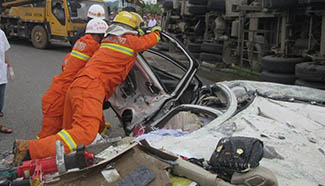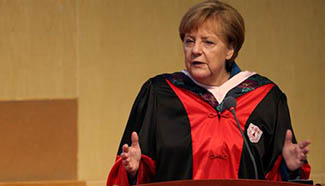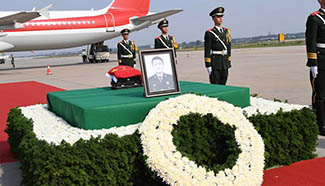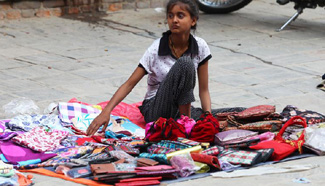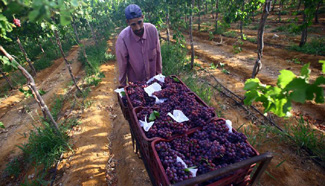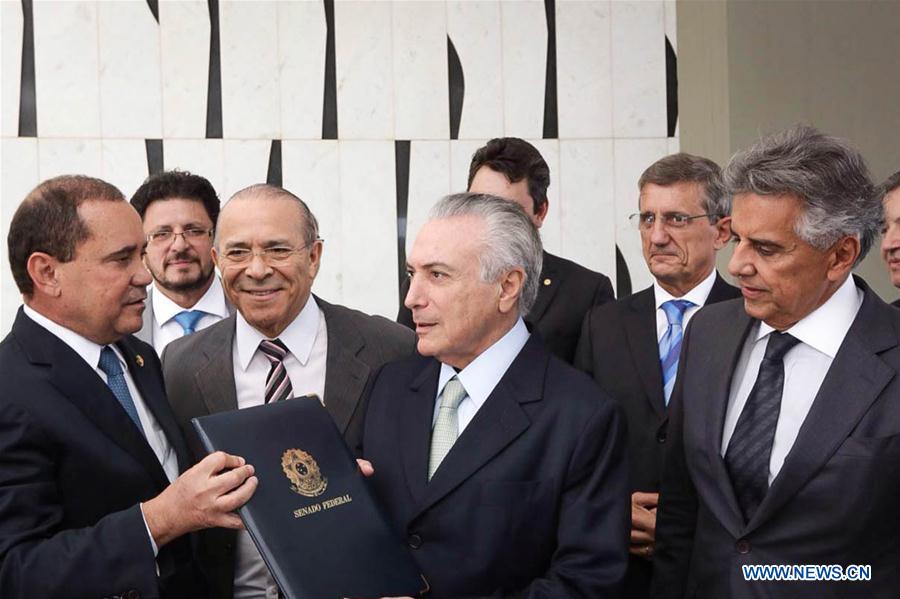
BRASILIA, May 12, 2016 (Xinhua) -- Brazilian Vice President Michel Temer(C), holds the Senate notice promoting him to acting president in Brasilia, capital of Brazil, on May 12, 2016. The Brazilian Senate Thursday voted to continue the impeachment process against President Dilma Rousseff, suspending her from office for 180 days. (Xinhua/AGENCIA ESTADO, file photo)
BEIJING, June 13 (Xinhua) -- The political change in Brazil featuring interim President Michel Temer's government reshuffle and major policy shift has posed a test of the capability of the five-nation bloc of BIRCS to promote economic development through multilateral cooperation.
Temer has made a radical reshuffle of Brazil's cabinet and adjusted the country's external policies as of Sunday, one month after President Dilma Rousseff was suspended from office pending her impeachment trial.
Analysts said Brazil's interim government is likely to put its cooperation with other BRICS countries -- Russia, India, China and South Africa -- in a secondary place. Whether the BRICS countries stand united and whether their cooperation mechanism functions smoothly will be crucial for the development of the bloc.
MAJOR SHIFT IN FOREIGN POLICIES
Brazil always valued its cooperative relations with other BRICS countries after the birth of the bloc in 2009. However, the political developments in Brazil since the suspension of Rousseff from office are resulting in readjustment of its foreign policies.
Interim Foreign Minister Jose Serra outlined new priorities in foreign policies in his first public appearance on May 18.
According to him, Brazil would instead put emphasis on bilateral ties with Argentina and Mexico and, meanwhile, make it a priority to restore the "traditional partnerships" with the United States, Europe and Japan.
On cooperation with other BRICS countries, Serra said Brazil will seize opportunities brought about by this mechanism with an eye to enhancing trade and investment cooperation among its members.
A subtle difference was noticed from the terms frequently used by Rousseff such as "strategic cooperation" and "diplomatic priorities."
Amid the volatile political situation in Brazil, the fate of Rousseff remains to be seen before the last two rounds of vote at the Senate.
Zhou Zhiwei, executive director of the Brazil Research Center, a unit of the Chinese Academy of Social Sciences, said that no matter what the final result is, the fermenting political crisis could lead to a "backtrack" in the foreign policy of Brazil and affect its dedication to the BRICS mechanism in the short term.
BRICS TRANSFORMED
The term BRIC, coined by Goldman Sachs Chief Economist Jim O'Neill in 2001, refers to the grouping of the four fast-growing emerging economies of Brazil, Russia, India and China.
In 2006, Goldman set up the BRIC Fund, which generated fairly good returns for its investors in the first few years. However, with sharp declines in prices of commodities since 2013, BRICS experienced a slowdown in economic growth. Brazil and Russia even registered negative economic growths. In November 2015, the BRIC Fund was finally closed.
Western media see the closure as a sign of BRICS on the decline, and some even started to talk about the "death of BRICS" and the potential collapse of the cooperative mechanism among the bloc members.
Zhou holds a different point of view. The unfavorable external environment might be an incentive for the members of the bloc to boost their cooperation, he said.
"The fundamental strengths of BRICS, such as the market and population mass, won't go away for the cyclical downturns of some BRICS members. They still will shine in future economic development," Zhou said.
"Since the creation of the BRICS summit, the bloc has been more than just an economic concept. It is a platform for the emerging economies to exert their influence on the global economic arena," said Shen Yi, director of the Center for BRICS Studies at Fudan University.
IN-DEPTH COOPERATION KEY TO BRICS' DEVELOPMENT
In July 2014, BRICS leaders unveiled plans to establish the New Development Bank (NDB) and a contingent reserve arrangement (CRA). A year later, the NDB was formally established, headquartered in Shanghai.
The move, aimed at boosting the independence of developing economies, has been viewed by Western media as an attempt to challenge the existing international financial framework dominated by developed economies.
In a sign of its efficiency, the NDB announced in April this year that it will provide 811 million U.S. dollars of financing for four renewable energy projects in Brazil, India, China and South Africa.
Zhou said that in the wake of Rousseff's suspension from office, it is possible for Brazil to backtrack in its foreign policy. He suggested that the BRICS countries strengthen their economic ties and optimize the NCB and CRA mechanisms so as to avoid their cooperation being affected by the potential spillover from domestic political changes.
It is important for the BRICS members to meet on the sidelines of multilateral conferences to coordinate their policies, Zhou said.
Shen said the BRICS countries can further their cooperation in market access, foreign reserves and counter-cyclical long-term loans.
Shen said China could play a leading role in prompting BRICS members to strengthen their cooperation mechanism in face of crises.
"In this way, BRICS could evolve into a more closely knit community underpinned by common interests and have more say in global economic governance," Shen said.





